- Home
- Ninie Hammon
Black Water
Black Water Read online
Black Water
Through the Canvas: Book One
Ninie Hammon
Copyright © 2020 by Sterling & Stone
All rights reserved.
No part of this book may be reproduced in any form or by any electronic or mechanical means, including information storage and retrieval systems, without written permission from the author, except for the use of brief quotations in a book review.
Contents
Chapter 1
Chapter 2
Chapter 3
Chapter 4
Chapter 5
Chapter 6
Chapter 7
Chapter 8
Chapter 9
Chapter 10
Chapter 11
Chapter 12
Chapter 13
Chapter 14
Chapter 15
Chapter 16
Chapter 17
Chapter 18
Chapter 19
Chapter 20
Chapter 21
Chapter 22
Chapter 23
Chapter 24
Chapter 25
Chapter 26
Chapter 27
Chapter 28
Chapter 29
Chapter 30
Chapter 31
The Series Continues…
A Note from the Author
Also By Ninie Hammon
About the Author
Chapter One
Hadn’t taken T.J. Hamilton long to find it in the back of the storage shed, wrapped in a tattered rag quilt the mice had gotten into and eaten big hunks out of. He had kept up with it for more than half a century because … He didn’t know why, had never before today questioned why. He’d just kept it, that’s all.
Now, he pushed his West Virginia University ball cap back, cocked his head to the right and shook it slowly, staring at what he had just leaned against the wall. It was illuminated by the light streaming through the phlegm of dirt on the garage door windows, and the bright orange sunset splattered across grumbling storm clouds granted it an eerie, rosy glow — not that it needed an otherworldly shine to make it creepy. It was plenty spooky enough all by itself.
A sense of unreality washed over T.J. and he felt more confused, more dumbfounded than he’d ever been in all his — what? Going-on-seventy years? Sixty-nine, no, sixty-eight. He always had to concentrate to recall how old he was because age was such a meaningless number he’d never bothered to keep track of. The suggestion of a smile pulled at the corners of his lips. Shoot, he probably looked like his grandmother’d looked when she used to come visitin’ from Nashville when he was a little boy, in Before.
T.J.’s childhood was split in two like an axe stroke right down the middle, with before Mama fell and hit her head lined up on one side and everything that come after on the other.
Last time he’d seen his granny, her ebony skin’d been wrinkled up like a raisin, but she’d been all plump and round and T.J. couldn’t have managed 145 pounds if he took three runnin’ jumps at the scales. At six feet tall, that was skinny. In the last few years, his belt had got where it wouldn’t keep his pants up, and he wasn’t gonna wear ‘em halfway down his butt with his underwear showin’! So he’d bought himself a pair of suspenders, bright red ones. He had a habit of hooking his thumbs in them when he was considerin’, trying to figure something out. He had his thumbs hooked in his suspenders now, but wasn’t nothing to figure out here. It was what it was.
And what it was was a painting. Looking at it here, seein’ it unwrapped for the first time since Mama’d hid it in the chicken house two days before she knotted an extension cord around her neck and hung herself from a barn rafter, turned his knees to bags of water. It stole his breath, the reality of it leapin’ out at him as crisp and clear as it’d been when the paint was still wet almost six decades ago. And he felt terror crawling on hairy black legs up the back of his throat like he hadn’t felt since them days, wakin’ up every morning in After.
Oh, he’d known fear in all the many years since then, been scared lots of times. Didn’t seem like he’d had more’n half a dozen solid bowel movements the whole time he was in Vietnam. But that was life scared. It was real. Natural. Not like this. Wasn’t nothing natural ‘bout this and maybe wasn’t nothing real about it neither. Maybe he was just imaginin’, maybe—
The back porch steps creaked and then the screen door squawked, but T.J. didn’t go back into the kitchen right away. He couldn’t drag his eyes away from the painting. It couldn’t be. Could. NOT. Be. But it was, and he couldn’t stop staring at it. Which was the point, of course. That right there told him everything he needed to know.
Dobbs had poured himself a cup of coffee and was sittin’ at the kitchen table when T.J. came in from the garage. He had the reel off his fishing pole laid out in front of him, must have been tryin’ yet again to fix it so the line wouldn’t jam. Dobbs cocked his head to the right and then shook it the same way T.J. had shook his a few minutes earlier, staring at the impossible painting in the garage. Yeah, they’d taken up each other’s mannerisms after all these years. But that was the only way the two of them looked alike. Raymond Dobson was a barrel-chested man, had two or three chins marching down his neck into the t-shirt he wore beneath overalls that bulged out around his belly. T.J.’s wooly hair, the pale gray of a winter sky right before it snows, was cropped short. Dobbs’s shock of white hair was as unruly now as it’d been sixty years ago when it was pale blond and his mother’d tried to stick it down with Vitalis. After he’d told her one day he wished he was black like T.J. so his hair’d be kinky and stay put, she’d washed his mouth out with soap, and after that he and T.J.’d had to sneak off into the woods to play together.
“Somebody moved into the Watford House,” T.J. said and immediately wanted to bite off the end of his tongue. What’d he say a thing like that for? The words had popped out and he wasn’t ready to talk about it, hadn’t got his own head around it yet.
“Who?”
Dobbs didn’t look up, was only half listening. He lifted his coffee cup and took a drink, his mind focused on the gnarl of fishing line stuck inside that reel.
“Not nobody local, not nobody I ever seen before.” But he had seen her before. That was the thing, wasn’t it. The whole thing. He had seen her before. “A moving truck, one of them with the little-kid drawing on the side that says ‘Two Guys and a Truck’ was parked out front a week ago Tuesday, but all I seen was four guys who didn’t look nothin’ like that drawing hauling furniture into the house. So I been watchin’, trying to catch sight of the new tenant.”
He was stalling.
“I seen her for the first time two days ago, carrying empty boxes out onto the porch.” He paused, tried to throw the next words away. “She looked … kinda familiar, though, but I couldn’t place her.”
Dobbs stopped what he was doing and made a big show of looking out the window and up at the sky.
“I don’t see anything yet.” In mock seriousness, he searched a stormy sky darkening toward evening. “But it’ll start raining frogs any minute now.” He glanced at T.J., a grin deepening the creases in the folds of his big cheeks. “You not remembering a face, that’s one of the final signs of the Second Coming.”
Then he went back to work on the reel, not looking at T.J.
“Oh, I finally did figure out where I seen her before.”
“Where was that?”
There it was then. Beyond that question lay two different worlds. In one of them, T.J. could go on with life like it’d been all these years, could take that canvas out of the garage into the backyard, pour gasoline on it and burn it, like he’d seen his mama do with canvases time and time again. Or throw it into the lake. He still had time. He could—
“Rememb
er when we was kids—”
Dobbs pinched his finger in the mechanism and dropped the reel on the table in disgust.
“I remember we could go fishing without having to spend all day untangling the danged line! Those cane poles and plastic corks, they worked fine. Why’d I ever let you talk me into buying this thing?”
He picked the reel back up and began to pull on the line again.
“Remember…” T.J. took a deep breath. “Remember how Mama … used to paint.”
Dobbs froze in place as still as a tombstone.
They hadn’t never talked about it. Never mentioned it, not one time in all the years they’d known each other. When it was over, when that time was done, they acted like it had never happened, and both of them honored an unspoken agreement never to speak of it.
“Yeah.” His voice sounded airless and haunted. “Of course, I remember. Why would you ask me a question like that?”
“It’s just that … well, the woman at the Watford place, she was on the porch … painting.”
“Painting what?”
“What do you think?” T.J. snapped. “The porch railing? Her toenails? A hippopotamus sittin’ in a mud hole in the middle of the front yard?”
T.J. spun away from Dobbs, went to the cabinet, got a mug from it and set it down on the counter in front of the coffee pot. “She was paintin’ a picture, that’s what.”
“What kind of picture?”
T.J. reached for the pot, then stopped, afraid that if he tried to pour a cup, his hands would shake.
“No, it ain’t that.”
“She was painting a table with a fruit bowl or flowers on it, and behind the table there was a window.” Awe and wonder and more than that colored Dobbs’s words. “There was, wasn’t there?”
“No, I’m just sayin’ she was painting was why I noticed her.” That wasn’t why, though. He’d have noticed her if she’d been on the porch plantin’ daisies. But he’d got Dobbs started and the big man was rolling downhill, gaining speed the farther he went.
“But there was nothing in the window. It was blank. Not blank as in nothing special — you could see out of it and there was a yard or a tree or a pond — but blank as in empty, no image at all?”
Oh, how T.J. wished he hadn’t said nothing. How he wished he’d minded his own business and then he wouldn’t have had to try to keep his mouth shut about it to Dobbs.
Dobbs wouldn’t let it go, of course.
“T.J., you think what she was painting is…?” Dobbs stopped, like he’d just realized how preposterous such a suggestion was. “After all these…? That was … what? Forty-five years ago? No, fifty. Sixty! She was painting—?”
“I never said that!”
T.J. hadn’t meant to shout, but the words exploded out of him. When he spoke again, it was so soft he had trouble hearing it his own self. “Her paintin’, that put me in mind of … that’s all. This ain’t about what she was painting, about the picture.”
“Then what is it about?”
T.J. let out a breath of surrender. He was in too deep now, wasn’t no way out but to tell Dobbs the whole story. And who did he think he was foolin’ anyway? He was always gonna tell Dobbs all about it.
If T.J.’d done what he’d ought to have done — walked on by, payin’ that woman no mind — he wouldn’t have had to go diggin’ around in the dust of that shed looking for what he hadn’t laid eyes on in more than half a century. But he hadn’t done that. When he’d seen the woman on the porch with her easel all set up, a pallet in her hand — well, that sight alone … he never seen somebody paintin’ a picture that it didn’t make his heart stutter a couple of beats. It was her face that’d stopped him, though. T.J.’s memory for faces was legendary. The two previous times he’d seen her, she’d looked familiar, but he’d let it go. This time, though, she was standing still, concentrating, and he’d got a good look. When he did, he instantly acknowledged two contradictory certainties. He had never met the woman standing on that porch. And he knew her.
He had to get a closer look at her, so he leaned over and unhooked the leash from Sparky’s collar.
“Go make a new friend,” he said quietly, and Sparky took off. He was the most social little mutt in all of Kavanaugh County. Soon’s he seen somebody on the sidewalk coming toward him he’d start tuggin’ at the leash, wantin’ to get closer so he could jump up and down and they’d make over him like they hadn’t never in their lives seen an animal adorable as he was.
The little dog scampered across the grass that needed mowing and up the porch steps. And, of course, she done what everybody else always done soon’s they seen Sparky.
“Oooh!” Women all made that same squeaky sound. “That’s the cutest little dog!”
And Sparky was cute, alright! Not one doubt about that. He looked like a stuffed animal, fur two inches deep that was so soft and fluffy it didn’t even feel real. Apricot colored, that’s what the breeder’d called it. His ears was red, though, Irish Setter red. His face was lighter and he had a white patch of fur on his chest right where he’d have had an S if he’d been Superman. All four of his feet was white, too, like he was wearing booties. And danged if it didn’t look all the time like he was smiling, that Golden Retriever smile that melted the hearts of anybody, anywhere, any age, who’d ever in their lives let themselves fall in love with a dog.
The woman’s face had lit up soon as Sparks got near her. T.J. followed along behind and the world got less and less stable under his feet the closer he got. Her hair was striking, long black curls with such a lustrous shine that movement sent silvery highlights sparkling across the surface. Even in the bright sunlight, her hair had the shimmering quality of moonlight on a midnight sky. Her eyes were hazel, multicolored dark green like the surface of a still pond reflecting the trees and grass on the shore. Even thin as she was — not skinny, boney like he was but on her way there — you could tell she’d round out nicely once she got some meat on her bones. Her face was pretty, not what you’d call strikingly beautiful. But probably wouldn’t take much woman’s magic with makeup and such to turn her into a show-stopper.
She set the pallet on a little tray thing on the side of the easel and got down on her knees in front of Sparky.
Of course, Sparky was all over her, licking her hands and her face, any piece of bare skin he could find, wiggling and squirming in delight, his tail wagging so fast you couldn’t hardly see nothing but a blur.
The woman looked up at T.J. and he noted the dark circles under them green eyes, the hollow cheeks, pale skin, looked like a junkie ‘cept wasn’t no track marks on her arms. Sick, maybe. No, she wasn’t sick. That wasn’t it. This here was a woman life had kicked square in the gut and she hadn’t yet managed to suck in another lungful of air.
“What kind of dog is he?”
“A golden doodle, half poodle, half golden retriever. Only he’s a mini, weighs twenty pounds. It looks like forty ‘cause his fur’s so thick, but he won’t get no bigger.”
“What’s his name?”
She was rubbing Sparky in that special spot right behind his ears, and his eyes liked to roll back into his head from pleasure. This was somebody who knew her way around a dog.
“Sparky the Wonder Dog.” He was poised to answer the inevitable question. How he and Dobbs had gone to pick out a female, but this little guy’d followed T.J. around like he was on one end of an invisible string and the dog was on the other. So T.J.’d figured the dog had picked him. The thing was, though, all the dog names he was considerin’ was girls’ names, so Dobbs had joked…
She didn’t ask, though. She merely buried her face in the soft fur on the top of his head and made little cooing sounds that almost sounded like she was crying.
T.J. held out his hand. “My name’s Thomas Jefferson Alexander Hamilton.”
Then he started his rap, the one he used whenever he met anybody new. It rolled out effortless and smooth after decades of practice and it usually put folks at ease. “Now what k
ind of mama names a cute chocolate-drop newborn Thomas Jefferson Alexander Hamilton, dooming the poor little thing to a lifetime of funny looks and not enough space to sign the back of his driver’s license?” A one-beat pause. “They call me T.J.”
“Nice to meet you, T.J.” She reached up and shook his hand and that’s when it happened. She tossed her long hair to the side for an instant and there it was. On her neck, under her right ear. Three small moles arranged in a perfect triangle. T.J. never expected to see that again, on anybody. But it was real, wasn’t no denying it. She kept talking, rubbing on Sparky, introducing her own self, but T.J. didn’t hear what she said clearly, couldn’t because of the buzzin’ in his head like lunatic chainsaws. His heart stopped beating, went dead as an anvil, then it started up again frantic as a woodpecker trying to peck its way out of his chest. If he’d been a white man, he’d have turned the color of a new gym sock. Black as he was, though, his face likely resembled ashes in ice.
The woman happened to glance up from Sparky then.
“Is something wrong?”
Shoot, maybe he did look like a gym sock.
“Oh, no, I’m … ain’t nothing wrong. I…” His voice had the breathless quality of a man who’d just watched a water moccasin glide out of the shoreline reeds right where he was about to put his foot. Scrambling for something — anything — to say, he blurted out, “That painting … my mama was an artist.” He could hear himself babbling but couldn’t seem to stem the tide. “Mama had paint splatters on her all the time looked like M&Ms.”

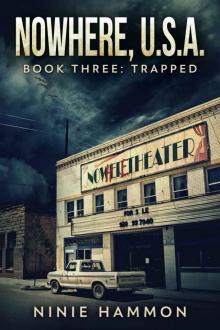 Trapped (Nowhere, USA Book 3)
Trapped (Nowhere, USA Book 3) Mad Dog (Nowhere, USA Book 2)
Mad Dog (Nowhere, USA Book 2) Black Water
Black Water Nowhere USA: The Complete Series: A Psychological Thriller series (Nowhere, USA)
Nowhere USA: The Complete Series: A Psychological Thriller series (Nowhere, USA)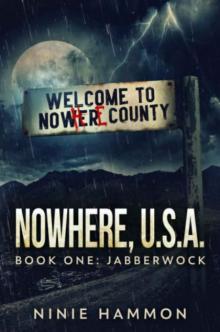 The Jabberwock
The Jabberwock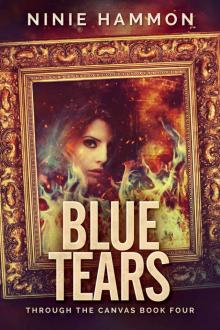 Blue Tears
Blue Tears Blown Away (Nowhere, USA Book 6)
Blown Away (Nowhere, USA Book 6)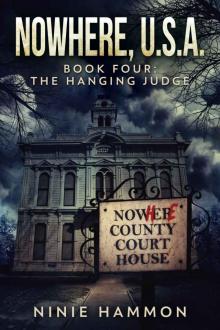 The Hanging Judge (Nowhere, USA Book 4)
The Hanging Judge (Nowhere, USA Book 4) Sudan: A Novel
Sudan: A Novel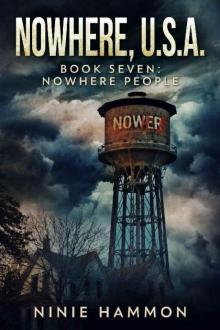 Nowhere People (Nowhere, USA Book 7)
Nowhere People (Nowhere, USA Book 7)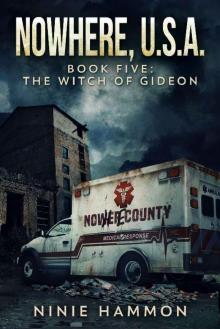 The Witch of Gideon (Nowhere, USA Book 5)
The Witch of Gideon (Nowhere, USA Book 5)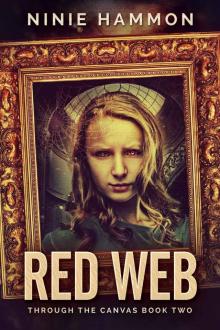 Red Web
Red Web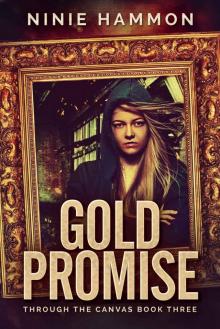 Gold Promise
Gold Promise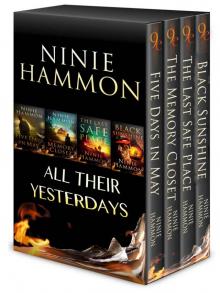 All Their Yesterdays
All Their Yesterdays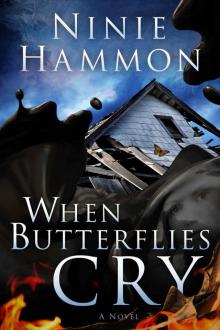 When Butterflies Cry: A Novel
When Butterflies Cry: A Novel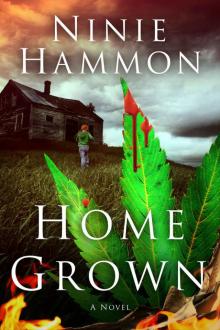 Home Grown: A Novel
Home Grown: A Novel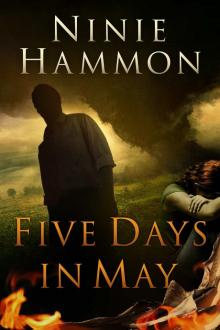 Five Days in May
Five Days in May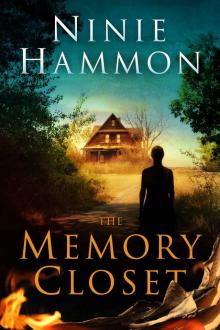 The Memory Closet
The Memory Closet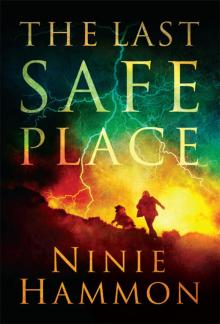 The Last Safe Place
The Last Safe Place The Knowing Box Set EXTENDED EDITION: Exclusive New Material
The Knowing Box Set EXTENDED EDITION: Exclusive New Material